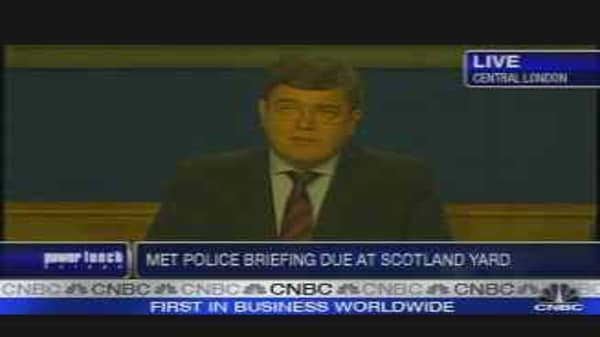Police cordoned off part of central London after they defused what they called a "potentially viable explosive device" found in a car.
Police said they went to The Haymarket, a street near the Piccadilly Circus landmark, just before 2:00 am London time because of a suspicious car.
The security alert came only two days after Gordon Brown took over as Britain's prime minister and one week before the second anniversary of the July 7, 2005 attacks that saw 52 commuters and four suicide bombers killed in London.
"As a precautionary measure the immediate area was cordoned off while the vehicle was examined by explosives officers," police said in a statement.
"They discovered what appeared to be a potentially viable explosive device. This was made safe."
The alert, in a zone normally packed with tourists, theater-goers and revelers, brought heavy traffic congestion to London's West End and disruption on the London Underground.
A blue tent covering what is believed to be the car was in place behind police tape, as what appeared to be plain clothes officers walked past.
The new Justice Secretary Jack Straw told BBC radio that the government had been informed of the alert.
Straw, the former home and foreign secretary, whose time as foreign minister was dominated by the Iraq war, declined to comment further. "It's really for the police to make statement when they judge the time is right."
An investigation has been launched by the Metropolitan Police's counter-terrorism unit. A spokesman said more information would be released later.
Britain is currently on the second highest level of security alert -- "severe."
The domestic intelligence service, MI5, assesses that there is a "serious and sustained threat from international terrorism to the U.K. and U.K. interests overseas. The current threat level is assessed as "severe".
"The most significant terrorist threat comes from Al-Qaeda and associated networks," MI5 said on its Web site.
There is also threat from the spread of weapons of mass destruction.
MET Police Briefing at Scotland Yard
Police have said the death toll could have been "significant" from the explosive device that was discovered in central London today.
Deputy Assistant Commissioner Peter Clarke, head of London's counterterrorism command, told reporters: "At this stage it is obvious that if the device had detonated there would have been significant loss of life.
"It was placed in a very busy part of central London, there would have been many people there," he said during a press conference.
The bomb was discovered in an abandoned green Mercedes in London's Haymarket district in the early hours of this morning.
DAC Clarke said the car was filled with explosives, nails and a detonation device.
"In the car they (police) found petrol and gas contained in several large containers, and a large number of nails.
"They (also) discovered a means of detonating the gas and fuel," he added.
DAC Clarke described how the bomb was discovered by chance when an ambulance crew, who had been at the scene for a separate incident, had noticed smoke inside the abandoned Mercedes.
"The ambulance crew saw what they thought was smoke, but we need to find out if it was smoke or vapor," he said.
He said that terrorists have spoken about attacking nightclubs in the past, although he said it was "too early to speculate" on the intended target.
Brown on London Security Alert
Prime Minister Gordon Brown said today's security alert in central London is a reminder that Britain faces "a serious and continuous threat" and the public needs to be alert at all times.
Brown was speaking after police made safe what they said was a "potentially viable explosive device" in the busy Haymarket district of the city.
Ahead of a meeting with senior ministers, he said: "The first duty of a government is the security of the people.
"And as the police and security services have said on so many occasions, we face a serious and continuous threat to our country. We should allow the police to investigate.
"This incident does indicate the need for us to be vigilant at all times...I will stress to the cabinet that the vigilance must be maintained over the next few days."
The prime minister said new Home Secretary Jacqui Smith would chair a meeting of Britain's emergency contingencies committee, COBRA, before briefing the cabinet.
Home Secretary Smith Says U.K. Faces 'Serious, Sustained Threat'
Britain is facing a "serious and sustained threat" from terrorists, said new Home Secretary Jacqui Smith, while also announcing that Sir Alan West, a former First Sea Lord, had been appointed Security Minister at the Home Office.
Speaking after a meeting with Prime Minister Gordon Brown, Smith said she had chaired a session with the government's "Cobra" committee made up of ministers, police, emergency services and intelligence agencies.
"We are currently facing the most serious and sustained threat to our security from international terrorism," she said outside Downing Street.
"This latest incident reinforces the need for the public to remain vigilant and to be alert to the threat that we face at all times".
Britain currently faces a "severe" risk from terrorism -- the second-highest level -- meaning an attack "is highly likely and indicates a continuing high level of threat," according to the domestic intelligence service MI5.




